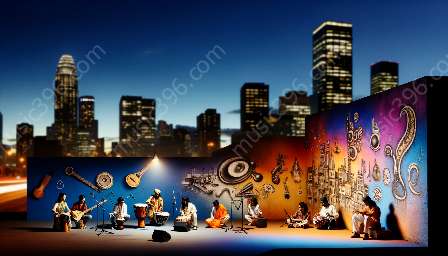Music has long been recognized as a powerful force in the construction of identity and belonging, playing a significant role in shaping cultural and individual identities within societies. Understanding the ways in which music participates in this construction is a key focus of contemporary issues in ethnomusicology, the study of music in its cultural context. This topic cluster will explore the multifaceted relationship between music, identity, and belonging, drawing on insights from ethnomusicological research to shed light on the complex interplay of music and cultural expression.
The Power of Music in Shaping Identity
Music serves as a reflection of cultural values, beliefs, and traditions, providing a platform for the expression and preservation of identity. Through sonic elements such as rhythm, melody, and lyrics, music carries the collective experiences and narratives of a community, contributing to a sense of shared identity among its members. In this way, music acts as a mirror through which individuals and communities can recognize and reinforce their cultural identity.
Moreover, music can act as a catalyst for the construction of individual identity, offering channels for self-expression, affiliation, and affirmation. Whether through the adoption of musical genres, styles, or symbols, individuals can align themselves with particular musical communities, creating a sense of belonging and self-identification derived from their musical preferences. The dynamic relationship between music and identity is a central focus of ethnomusicological inquiry, as scholars seek to unravel the intricate processes through which music shapes and reflects individual and collective identities.
Musical Traditions and Belonging
Within cultural contexts, music often serves as a marker of belonging, forging connections between individuals and their communities. Musical traditions, rituals, and performances provide a medium through which individuals can affirm their membership in a particular social or cultural group. These traditions are deeply embedded in the fabric of social life, shaping the ways in which individuals relate to their communities and engage in collective experiences.
Through participation in musical events, such as festivals, ceremonies, or communal performances, individuals not only express their cultural allegiance but also establish a sense of belonging within their social milieu. Ethnomusicologists examine the role of musical practices in creating and sustaining bonds of belonging, shedding light on the pivotal role of music as a unifying force within diverse cultural contexts.
Music and Identity Negotiation
Music serves as a dynamic tool for negotiating identity within complex social landscapes, where individuals navigate multiple cultural influences and affiliations. Particularly in multicultural societies, music plays a pivotal role in processes of identity negotiation, acting as a site for the blending, adaptation, and redefinition of cultural identities.
Through the fusion of diverse musical styles, languages, and narratives, individuals can forge hybrid identities that reflect their complex social and cultural realities. Ethnomusicological scholarship delves into these processes of creative negotiation, examining how music facilitates the articulation of multifaceted identities that transcend traditional cultural boundaries. By exploring these instances of identity negotiation, contemporary issues in ethnomusicology offer valuable insights into the fluid and adaptive nature of cultural identities as manifested through musical expressions.
Diversity and Representation in Music
Contemporary ethnomusicology also grapples with questions of diversity and representation within musical practices, recognizing the importance of equitable and inclusive frameworks for understanding musical identities. As scholars critically engage with issues of cultural appropriation, stereotyping, and power dynamics in music, they strive to amplify marginalized voices and address the complexities of representation in the construction of musical identities.
By centering the experiences and perspectives of underrepresented communities, ethnomusicologists seek to foster a more holistic understanding of the diverse ways in which music participates in the construction of identity and belonging. This inclusive approach not only enriches scholarly discourse but also contributes to the promotion of social justice and equity within the study of music and culture.
Conclusion
In conclusion, the relationship between music, identity, and belonging is a rich and multifaceted terrain that continues to captivate scholars and practitioners within the field of ethnomusicology. By delving into the ways in which music participates in the construction of identity and belonging, contemporary issues in ethnomusicology offer valuable insights into the intricate interplay of cultural expressions, individual affiliations, and collective belonging. Through ongoing research and critical discourse, ethnomusicologists strive to unravel the complexities of musical identities, enriching our understanding of the diverse ways in which music shapes, reflects, and negotiates the multifaceted tapestries of human identity.



































